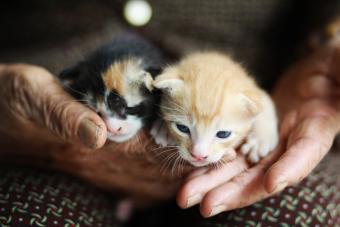
Whether your mama kitty is expecting or you've recently welcomed some adorable fur babies, the first six weeks of a kitten's life are both crucial and awe-inspiring. The weeks are full of growth and transformation, and watching kittens at each stage is incredible. This week-by-week rundown of kittens from newborn to 10 weeks highlights the changes you can expect to see. Remember, all kittens are a little different. Some may develop slightly slower, while others will grow quickly.
Week One: Dependent On Mom

Let's talk about those initial, heart-melting moments when the kittens have just been born. At this stage, kittens are utterly helpless. Their eyes and ears are closed, and they can't regulate their body temperature. It's crucial to ensure that they stay warm and get immediate access to their mother's milk, which provides essential nutrients and antibodies.
Kittens will share their mother's immunity to a variety of diseases. They receive it through the colostrum that the mother produces for 24 to 48 hours before producing milk. This immunity will usually keep them healthy until it's time for their first vaccinations.
Although there aren't too many new developments in the first week, here's what else you should know.
- Undeveloped digestive system: The mother cat stays close to her newborn kittens during this week. She keeps them warm with her body, bathes them, and massages their bellies with her tongue to help them urinate and defecate. This gentle massage is important to the kitten, whose digestive system is not running at full speed yet.
- Umbilical cord: During the latter part of the first week or early part of the second week, the kitten's umbilical cord stub will fall off completely.
Week Two: Awareness

You will notice the kittens slowly become aware of their littermates. Although they're still too weak for play, they will compete for their favorite teat when it's time to nurse. Their eyes will begin to open, and they'll be completely open by the end of this week. Their eyes will start out blue and may remain blue for several weeks before turning to their permanent color. Although their eyes are open, your kittens don't see very well. Their vision is blurry, and you should keep them out of bright lights to protect their new eyes.
Week 3: Walking Begins

The mother cat's job is getting easier by the day, and she probably isn't spending as much time with her kittens. Mom no longer needs to massage the kitten's belly to help them eliminate, but you'll still see her doing most of the grooming.
The kittens may attempt to walk, and their vision is getting better and better by the day. Also, the kittens' baby teeth have started to come in, and this prepares them to eat solid food. This week or next, introduce your kittens to their litter box. Use a shallow box lid and a few inches of litter until the kittens get used to using the box.
Some veterinarians suggest the first round of deworming begins in week three, but ask your family vet before this happens.
Week Four: Exploration

By week four, you can expect your kittens to explore their environment and interact with their littermates. By the end of the week, they will romp and play in between naps and nursing. You can expect to see a big growth spurt.
At this stage, all a kitten's senses have developed. Their ear canals will be completely open by the end of this week, and their vision will be as good as an adult cat's vision. You can now start the weaning process with canned food. Ensure the food is formulated specifically for kittens and be patient. The kitten still needs to nurse to supplement the canned food.
Kittens who have been handled 15 to 40 minutes per day over the first seven weeks of their lives develop larger brains, so be sure to handle your kittens regularly.
Week Five: Let's Wander

By week five, your kittens are becoming little adventurers. They'll be more coordinated and explore the world beyond their immediate nesting area. You'll see them pouncing, jumping, and perhaps even attempting to climb. They should be close, if not fully litter-trained by this week.
The mischief is about to begin, so kitten-proofing your home is a must if you haven't already done so.
Week Six: Time to Socialize

Week six is all about socialization. The kittens are now interacting more with each other, their mother, and humans. They're learning critical cat behaviors like grooming and using the litter box consistently. If you haven't done so already, this is an excellent time to acclimate them to being held and touched.
Week Seven: Weaning Complete

The weaning process should be complete around this time. At this point, your kittens are venturing out more, and they're honing their motor skills. They're running, pouncing, and playing with a newfound sense of coordination. Socialization is still key here, so encourage gentle handling and introduce them to various household noises and experiences.
This is a good time to introduce a scratching post to allow kittens to get used to using a post instead of the furniture.
Week Eight: Sharp Teeth

The kittens' teeth are fully in place, and they are as sharp as needles. The ASPCA notes at this age, kittens are old enough to be safely spayed or neutered. Your vet can also accurately determine the gender of your kittens at this stage, if you haven't figured that out already. Health check-ups are critical to ensure they're on the right track to becoming a healthy kitty, so don't skip this milestone vet visit.
Week Nine: On the Go

By week nine, kittens are becoming more proficient at eating solid food, and they may even show preferences for certain types and flavors. You'll notice that they're drinking less from their mom and are relying more on kitten-formulated food for their nutritional needs. They'll need their final round of deworming, followed by a monthly heartworm preventative.
Keep them on a high-quality kitten food that provides all the nutrients they need to continue their rapid growth.
Week Ten: Personality Plus

As you approach week 10, you're going to see more of each kitten's individual personality coming through. Some may be more adventurous and outgoing, while others might be more reserved and observant. This is also a fantastic time to introduce toys that stimulate their mental and physical faculties. Teasers, tunnels, and even simple balls can offer entertainment and development benefits.
Kitten Developments Over the Next Year

During the rest of the first 18 months of their lives, the stages of kitten development will not be so dramatic. Kittens will continue to grow and learn to socialize. They will hone their hunting skills, sneaking up on unsuspecting pieces of paper and socks while establishing some aggressive play with littermates.
Raising a Kitten
Raising kittens is a fun experience, but it can be a lot of work. If you're unsure if your kitten is developing properly, contact your vet. Your kittens will grow leaps and bounds in their first year, and they will learn to be part of your family — and that is the most important development of all.







